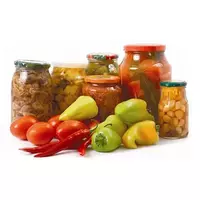Canned vegetables

Vegetables are an important component of a person's daily diet. People began to eat vegetables at the dawn of their existence. In the era of Antiquity, vegetables began to be cultivated on an industrial scale. It was then that a whole branch of both science and agriculture began to emerge under the name vegetable growing. The chemical composition of the vast majority of vegetables contains a huge amount of all kinds of useful compounds, vitamins, as well as biologically active compounds that bring tangible benefits to the human body.
Since ancient times, people have tried to find the perfect way to preserve vegetables for future use. As a rule, vegetables are harvested in several ways - natural drying, freezing or canning. According to the terminology used in the food industry, canned vegetables are nothing more than a food product made from various varieties of vegetables and suitable for sufficiently long-term storage. For a long time, canned vegetables remained the mandatory "strategic" reserve of each Soviet family for the winter.
Currently, canned vegetables can be purchased at any time of the year in the nearest domestic grocery store. However, true connoisseurs of canned vegetables believe that only a homemade product can be an excellent and useful treat for the whole family. It is believed that in the production of canned vegetables, modern food manufacturers do not particularly care about the quality of the starting natural material.
In addition, various food additives are necessarily present in the composition of canned vegetables of mass production, which help to give a certain taste, aroma and even set the color of the finished product. Therefore, if you are primarily concerned about your own health and the well-being of your family and friends, it is better to engage in canning vegetables at home. The conservation process does take a decent amount of time and energy.
However, the result is worth the effort, since you will end up with a high-quality and safe product for health. Indeed, canned vegetables contain much less vitamins and useful natural compounds. This is due, first of all, to the fact that during preservation, vegetables undergo heat treatment. However, the composition of canned vegetables will still be enriched with useful compounds that have a positive effect on the human body.
Canned vegetables have found wide applications in cooking. Canned vegetables can be served as a standalone snack. In addition, canned vegetables are added to salads, soups, meat, vegetable and fish dishes. Canned vegetables are included in various sauces. The most popular and in demand are such types of canned vegetables as: canned green peas, cucumbers, tomatoes and peppers, as well as corn, eggplant, beets, beans, capers and others.
canned vegetables 69 kCal
Energy value of canned vegetables (Ratio of proteins, fats, carbohydrates - ju):
Proteins: 0 g (~ 0 kCal)
Fats: 1.7 g (~ 15 kCal)
Carbohydrates: 0 g (~ 0 kCal)
Energy ratio (bj | y): 0% | 22% | 0%
 Español
Español Français
Français Português
Português Русский
Русский 简体中文
简体中文 繁體中文
繁體中文 日本語
日本語 한국어
한국어 العربية
العربية Türkçe
Türkçe Қазақ
Қазақ Deutsch
Deutsch Italiano
Italiano Українська
Українська
